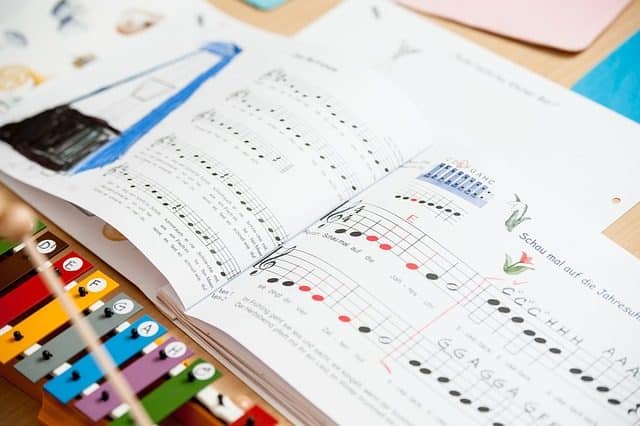Choosing the right music school can be a pivotal decision in an aspiring musician’s career. With a plethora of esteemed institutions across the country, identifying the 20 best music schools in the U.S. is no small feat. This guide spotlights the crème de la crème of music education, where each institution’s unique attributes contribute significantly to the fabric of artistic excellence.
From the halls of Juilliard to the innovative classrooms of Berklee College of Music, these schools not only provide unparalleled instruction but also form the backbone of cultural contributions in the music industry. Whether you’re pursuing classical training or contemporary music production, this article will steer you towards a school that resonates with your artistic ambitions.
Table of Contents
What makes a music school great?
Greatness in a music school is often a blend of faculty expertise, performance opportunities, and cutting-edge facilities. A reputable music school is one that nurtures talent through rigorous training and real-world experiences. It is not just about the name but the comprehensive pedagogy that sets the foundation for future successes.
Another hallmark of a great music school is its ability to attract and produce successful alumni. Such schools often boast a vibrant community where students are continuously pushed to excel. Their programs are designed to challenge conventional thinking, encouraging students to explore and express their unique musical voices.
Collaborative opportunities and networks within the music industry additionally elevate a music school’s status. These connections can provide students with a critical pathway to internships and employment post-graduation.
How are music schools ranked?
The ranking of music schools often considers a myriad of factors. Academic reputation, student-to-faculty ratio, and the diversity of programs offered are key elements evaluated during the ranking process. The success of an institution’s alumni also plays a crucial role, serving as a testament to the school’s quality of education.
Rankings may also assess the level of investment in music facilities, including state-of-the-art performance theaters and recording studios. These resources can greatly enhance the learning experience, providing students with practical insights into their future careers.
External reviews and accreditation from esteemed music education organizations further contribute to a school’s stature, ensuring that the school meets stringent criteria of excellence in music education.
What are the top music schools for performance?
When it comes to performance, certain schools stand out for their stellar programs. The Juilliard School, for instance, is synonymous with excellence in performance, offering students opportunities to showcase their talents on renowned stages. Institutions like Indiana University and Yale University also provide rigorous performance curriculums that prepare students for successful careers as musicians.
Their programs often include master classes with world-class musicians and frequent recitals, which are integral to honing a student’s performance skills. Moreover, these schools often have robust orchestras, ensembles, and solo performance opportunities that are important for a performer’s development.
Exposure to a wide range of musical styles and the chance to perform both contemporary and classical repertoire also distinguish the top schools for performance, catering to the varied interests of students.
Which music schools are best for contemporary music?
For those inclined towards contemporary sounds, Berklee College of Music stands out as a beacon of modern music education. Its programs are tailored to embrace innovation, diversity, and the evolving landscape of the music industry.
Berklee’s unique approach to music education includes a focus on music technology, songwriting, and production, preparing students for diverse careers in the music industry. Other schools like the University of Southern California also offer comprehensive programs that delve into the realms of jazz, pop, and film music.
These institutions are not just teaching the art of music but also the business side of it, a crucial aspect for any musician in the contemporary music scene.
What should you consider when choosing a music school?
Selecting a music school is a personal journey that hinges on various considerations. Prospective students should evaluate the school’s curriculum and ensure it aligns with their career goals. Consider factors like location, faculty expertise, and the types of opportunities available for performance, networking, and internships.
Another critical aspect is the culture and environment of the institution. A supportive and collaborative atmosphere can greatly enhance the educational experience, providing a nurturing ground for talent to flourish.
Cost and scholarship opportunities are pragmatic factors that cannot be overlooked. Music education is an investment, and finding a school that offers financial support can relieve some of the burdens associated with tuition fees.
What are the benefits of attending a music conservatory?
Attending a music conservatory offers a focused and intensive music education that is often unparalleled. Conservatories provide an immersive environment where everything from the curriculum to the community is centered around music. This allows for a concentrated study of one’s craft.
Networking opportunities with faculty and peers at a conservatory can also be incredibly valuable for building a career in music. Students often emerge with a strong, connected network that supports them professionally for years to come.
Moreover, conservatories frequently have partnerships with professional music organizations, presenting students with performance opportunities that are not readily available elsewhere.
What is the application process for top music schools?
The application process for top music schools can be rigorous and multi-faceted. Prospective students must often submit audition pieces, portfolios, and evidence of prior musical education. This process allows schools to gauge a student’s potential and fit for their program.
In addition to showcasing talent, applications usually require personal statements and letters of recommendation. These provide insight into an applicant’s character and dedication to their musical pursuits.
Preparation for these auditions and applications should ideally begin well in advance, with students honing their skills and gathering the necessary materials to present their best selves to admissions committees.
Music education in the United States is vibrant and diverse, offering a wide range of paths for the future musician. Whether you are seeking a hallowed conservatory or a modern institution that breaks musical boundaries, the options are ample. Each school listed in the 20 best music schools in the U.S. has its own unique strengths, ready to nurture the next generation of musical talent.
Insights Into the Top Music Education Programs
Indiana University’s Jacobs School of Music is renowned for its comprehensive music programs, encompassing everything from classical to contemporary music studies. With a large and diverse faculty, students are exposed to a broad spectrum of musical perspectives.
On the West Coast, the University of Southern California’s Thornton School of Music offers a dynamic blend of classical training and industry-focused programs like music business and technology.
The Curtis Institute of Music, although smaller in size, is mighty in tradition and excellence, focusing on cultivating musical masters through personalized training.
Preguntas Relacionadas Sobre las Mejores Escuelas de Música en EE. UU.
What is the #1 music school in the US?
The Juilliard School is often lauded as the top music school in the United States. Its rigorous programs and central location in New York City provide students with exceptional opportunities for growth and exposure to the music industry.
It is, however, essential to consider that rankings can vary based on different criteria, and what makes a school #1 could differ from one student to another based on personal goals and preferences.
What is the hardest music school to get into in the US?
Traditionally, the Curtis Institute of Music in Philadelphia has a reputation for being one of the most selective music schools in the country, with an acceptance rate that often falls below 5%. Its small size and high standards ensure that only the most dedicated and talented students are admitted.
Each year, thousands of hopefuls audition, but only a handful are chosen, making it a highly coveted spot for serious musicians.
What college has the best music education program?
Vanderbilt University’s Blair School of Music is highly regarded for its music education program. It provides a comprehensive curriculum that combines both performance and pedagogical skills, preparing students to become well-rounded music educators.
Other notable programs can be found at institutions such as the University of Michigan and Northwestern University, which are also celebrated for their contributions to music education.
What is the cheapest music school in the US?
While music schools are generally pricey, there are affordable options available. State universities often offer competitive music programs at a lower cost. For example, the University of North Texas and Florida State University are known for their robust music programs and relatively lower tuition, especially for in-state students.
Additionally, some schools provide generous scholarships and financial aid packages that can significantly reduce the financial burden on students.
Understanding the landscape of music education is crucial for aspiring musicians looking to make an impact in the industry. With the guidance provided here, students can begin their journey towards finding a music school that not only challenges and develops their talent but also supports their artistic vision and career goals.









